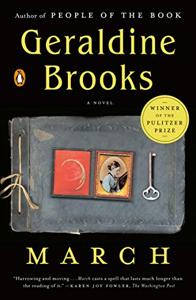
Want to learn the ideas in March better than ever? Read the world’s #1 book summary of March by Geraldine Brooks here.
Read a brief 1-Page Summary or watch video summaries curated by our expert team. Note: this book guide is not affiliated with or endorsed by the publisher or author, and we always encourage you to purchase and read the full book.
Video Summaries of March
We’ve scoured the Internet for the very best videos on March, from high-quality videos summaries to interviews or commentary by Geraldine Brooks.
1-Page Summary of March
Middlemarch is a unique novel. It has many characteristics of modern novels, but it also has characteristics that are typical to Victorian novels. Critics’ reactions were mixed, with some criticizing the book’s gloomy tone and others disliking Eliot’s use of literary allusions in her writing. Many critics felt women writers shouldn’t be so intellectual or scholarly. Some even criticized Eliot for not writing what they considered to be appropriate literature for women at the time. Although she disliked being confined by gender stereotypes and conventions, Eliot didn’t mind being labeled as a woman writer because she believed that “women who write like men are plagiarists; those who write well should declare themselves women.” She did dislike the idea of marriage ending a story because it was unrealistic and stereotypical when compared to real life experiences.
Moreover, Eliot’s critics found Middlemarch to be too depressing. She refused to bow down to the conventions of a happy ending for her characters. An ill-advised marriage between two people who are inherently incompatible never becomes completely harmonious. It actually becomes a burden on both parties involved because they’re not compatible in the first place. Such is the case with Lydgate and Dorothea’s marriage, which was doomed from day one because he was more interested in his medical career than being a husband or father. Dorothea was saved from living with her mistake for her whole life when her elderly husband died of a heart attack, but Lydgate and Rosamond married young before having children of their own so they had less time together as an unhappy couple.”
Two major life choices that people make are marriage and career. Eliot takes both very seriously, as they can affect a person’s well-being greatly. She believes that marriages based on compatibility work better than those where the couple doesn’t know each other at all before getting married. The same applies to women who have more of a say in their own lives; it helps them avoid unhappy relationships with men who don’t treat them right. Dorothea struggles because she has no power over her husband, Casaubon, while Rosamond is even less fortunate since Lydgate treats her badly as well.
In the book Middlemarch, Eliot describes the consequences of choosing a career that doesn’t fit one’s aspirations. She also details how confining women to the domestic sphere alone results in unhappiness. Dorothea’s passion for social reform is never realized and she ends up being just a wife and mother. Rosamond has shrewd capabilities but degenerates into vanity and manipulation; her stifled ambitions result in unhappiness for herself and her husband.
Middlemarch is not meant to be entertaining. Eliot wants to deal with real-life issues and the complexity of ordinary human life, rather than a fantasy world that women writers were often confined in. Her ambition was to create a portrait of the complexity of provincial society: quiet tragedies, petty character failings, small triumphs, and quiet moments of dignity. The complexity of her portrait is reflected in individual characters who have contradictions within them. One moment we pity Casaubon but then judge him critically later on.
Middlemarch is a novel that doesn’t follow the typical formula for novels. It’s not just about one person or relationship, but rather many people and relationships. Eliot has to include multiple characters in her book to represent provincial life, which was fairly experimental at the time because she was a woman writer.





